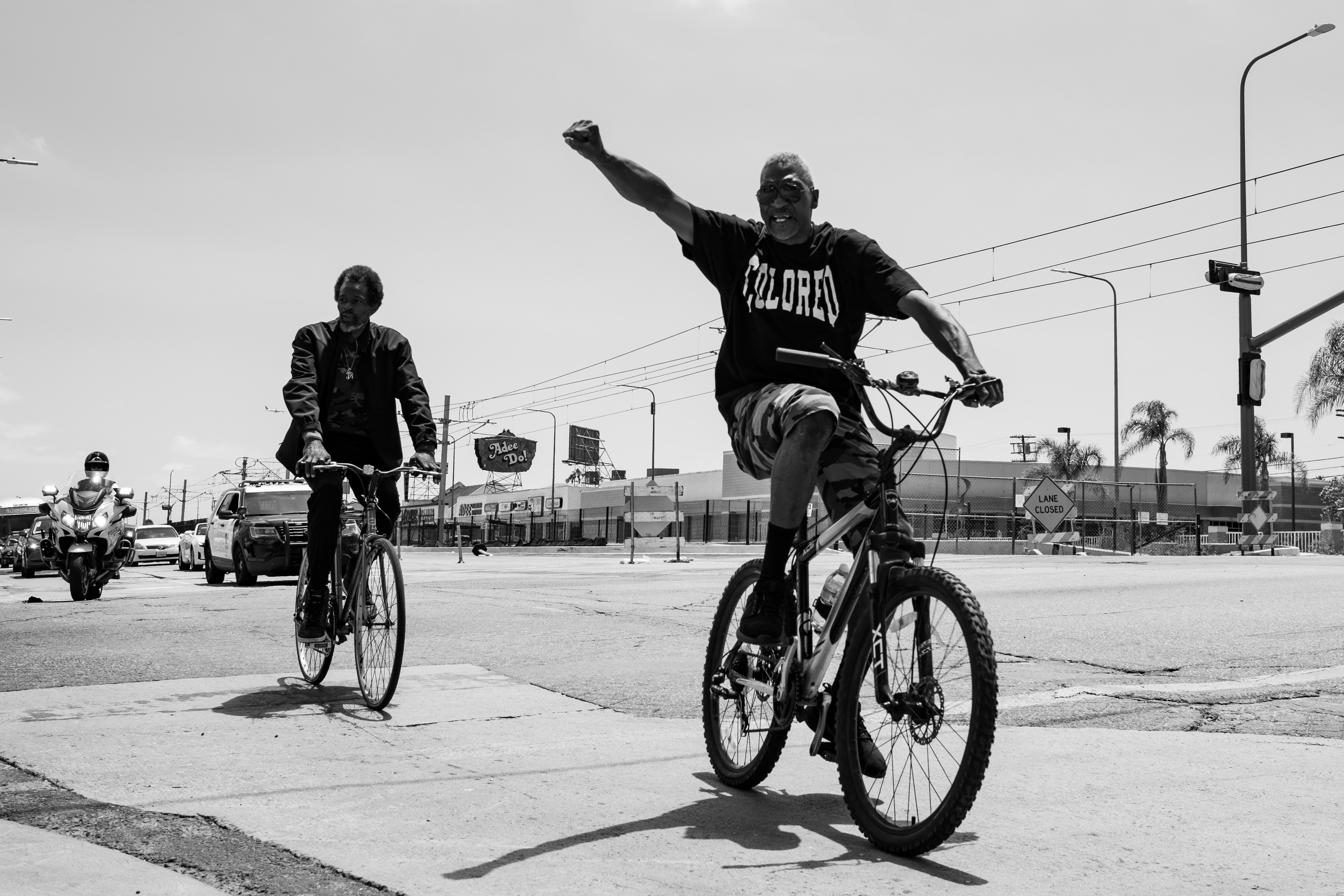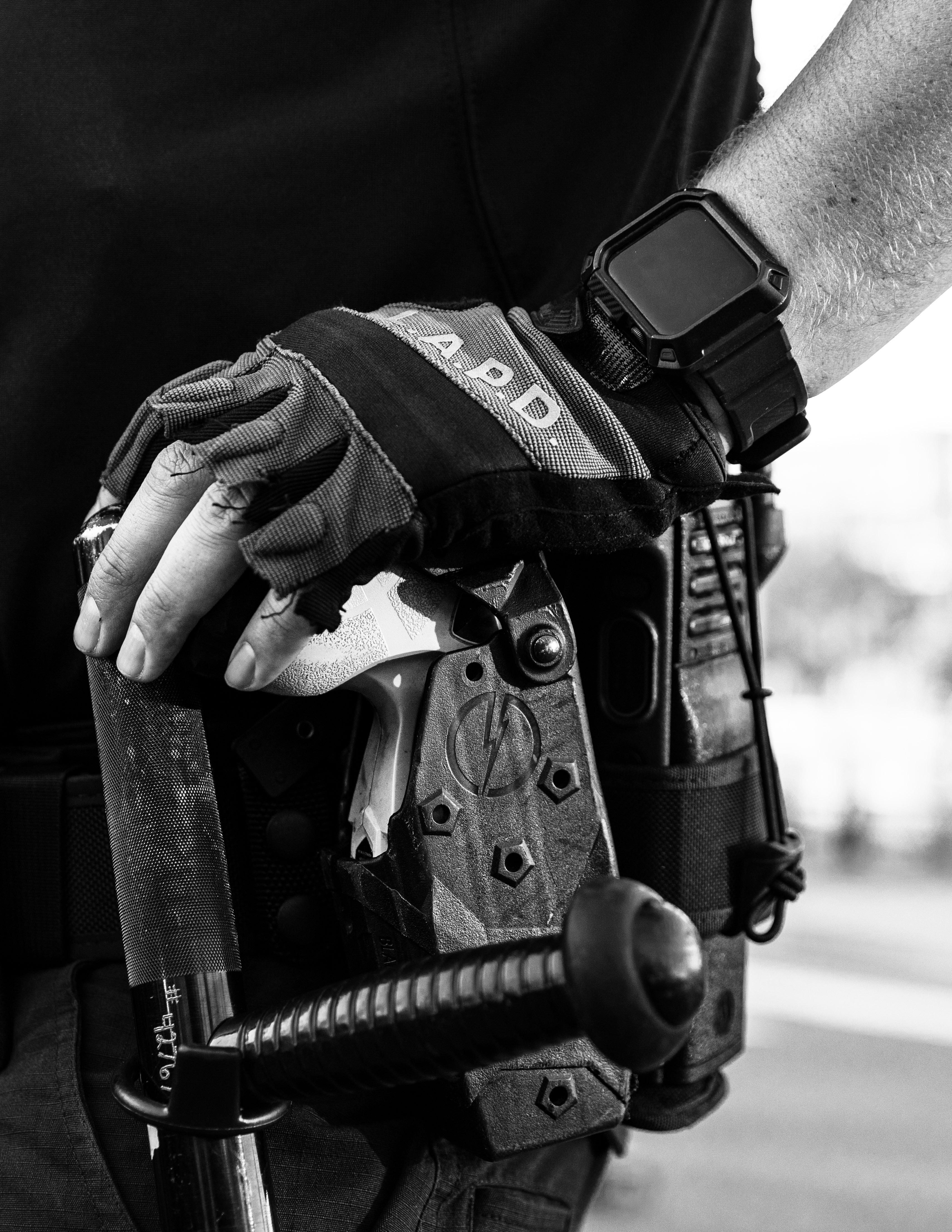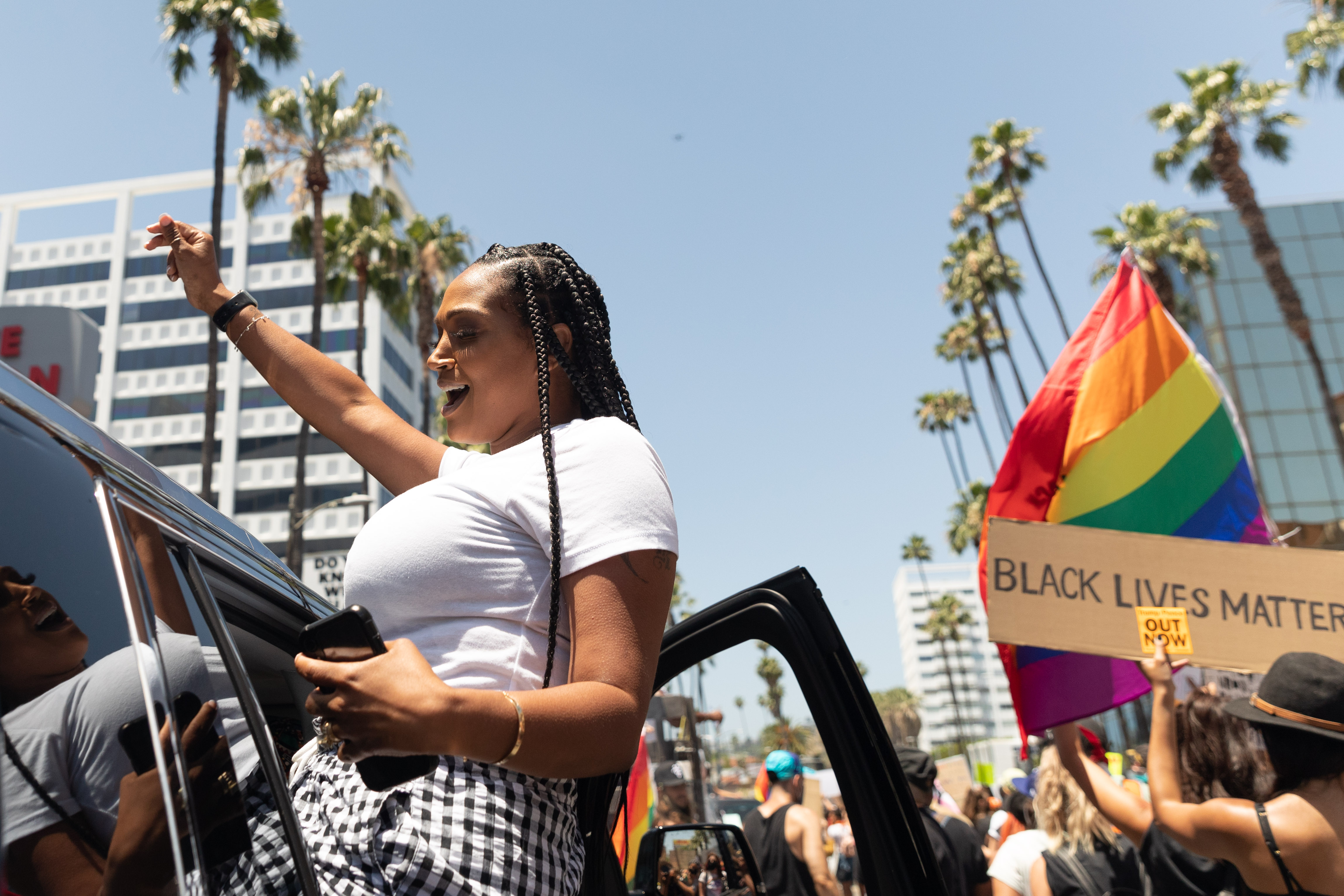In conversation with Sara Urbaez
Edited for length and clarity
Edited for length and clarity
Alexis Hunley:
Portfolio Overview

I saw that you're based in LA. What is your connection to LA and how long have you been there?
I was actually born here. My mom's family is here — my cousins are here, my aunts, my uncles, her side of the family — most of them are here. I moved back when I was 17 and finished my last year of high school here. This is home. I grew up throughout the Midwest and other states — Missouri, Florida, the D.C. area, Cincinnati — but we always lived in predominantly white neighborhoods and I went to predominantly white schools. Coming back to LA was the first time I ever lived in a neighborhood with Black neighbors and was able to see Black people shopping at the grocery store.
I never realized how much I needed to see things like that. So this neighborhood, in particular, is very, very important and special to me because of that.
I never realized how much I needed to see things like that. So this neighborhood, in particular, is very, very important and special to me because of that.

I was constantly in white-dominated spaces growing up. That's something that really resonates with me.
Because it is so important when you see people who look like you doing, grocery shopping, Black kids playing in the street, skateboarding — I never saw Black kids skateboarding. I wanted to skate so badly when I was in second grade, and I remember going to the skate park and it was all these white boys. And I thought, “I don't think I can do this.” So I never tried any stuff like that. The only kids I was playing with or hanging out with were white kids — a lot of them were really sweet and nice, but there was always that barrier, especially when you add in people's parents. It's never the same. . I never really got to experience the nuance and the intricacies within our community of Black.

I'm wondering how that informs how you photograph and why you’ve chosen photography as your medium.
Because we moved a lot and changed schools a lot, I spent a lot of time observing people, soaking everything in, and trying to see people. Photography was one way that I was able to do that. The way that I photograph now, it's very much impacted by that, as well as my background in psychology. It's my opportunity to fully immerse myself in the people around me — when others feel seen often times I feel seen.


You see people and you hear what they're trying to say. And I see that so much in your work. I’m interested in your imagery covering the Black Lives Matter protests and Nipsey Hussle’s death. What is it like documenting these powerful moments? Because these are such major news events. And it seems as though different photographers are flocking to cover them. What is that like for you as someone who sees LA as a home to witness the media frenzy? Did you notice outside photographers coming in and documenting it?
In the aftermath of Nipsey's murder, it was very unsettling in a way that I didn't expect — I’ve always been a fan of his music, his concert was one of the best I’ve ever been to in my life — but I didn't expect to be hit so hard emotionally.
I was actually out of town when he passed. His store is three blocks from my house, so when I got back into town, I just grabbed my camera and walked over there. I was taken aback by how many people arrived who were clearly not from this area. I remember there was a man, he was talking to somebody else about how he came from Europe. There were people from out of state and people from all around Los Angeles. It was very interesting because this area — it's the same people all the time. It’s usually the same guys who hangout in front of the barbershop. The same folks who walk their dogs every evening. Familiar faces. These faces I had never seen.
You could tell that the people who were normally there were also unsettled because they didn't know who these people were. There was this energy in the air — the people who came to take their smiling selfies for Instagram didn’t recognize they’re not necessarily here for the right reasons. It's always been odd to me how people treat celebrity deaths. This isn't a statue that was built to commemorate somebody. This isn't a building that's been left as a tour for somebody who died 50 years ago — this person died last week and you're taking selfies in front of it.
Some were there to pay respects. Some were there for Instagram, some to party. So I focused on capturing a breadth of those moments, like the folks who came and were smiling and partying versus the folks who were clearly heavily emotionally impacted and there to pay their respects. I remember there was a middle-aged Black woman praying and burning Sage over all the candles. And then next to her, this younger woman came and had her friend squat down and take a selfie with the mural behind her.
In relation to the protest, it is a very similar feeling of voyeurism. Almost like people who haven't taken the time to see us or understand us or listen to us now suddenly want to tell our stories visually. It's even more upsetting because I exist. Black photographers exist in every major city where protests are happening. We're everywhere. And we always have been. There's no reason any of us should not be getting assignments or be given opportunities to document our own spaces.
I was actually out of town when he passed. His store is three blocks from my house, so when I got back into town, I just grabbed my camera and walked over there. I was taken aback by how many people arrived who were clearly not from this area. I remember there was a man, he was talking to somebody else about how he came from Europe. There were people from out of state and people from all around Los Angeles. It was very interesting because this area — it's the same people all the time. It’s usually the same guys who hangout in front of the barbershop. The same folks who walk their dogs every evening. Familiar faces. These faces I had never seen.
You could tell that the people who were normally there were also unsettled because they didn't know who these people were. There was this energy in the air — the people who came to take their smiling selfies for Instagram didn’t recognize they’re not necessarily here for the right reasons. It's always been odd to me how people treat celebrity deaths. This isn't a statue that was built to commemorate somebody. This isn't a building that's been left as a tour for somebody who died 50 years ago — this person died last week and you're taking selfies in front of it.
Some were there to pay respects. Some were there for Instagram, some to party. So I focused on capturing a breadth of those moments, like the folks who came and were smiling and partying versus the folks who were clearly heavily emotionally impacted and there to pay their respects. I remember there was a middle-aged Black woman praying and burning Sage over all the candles. And then next to her, this younger woman came and had her friend squat down and take a selfie with the mural behind her.
In relation to the protest, it is a very similar feeling of voyeurism. Almost like people who haven't taken the time to see us or understand us or listen to us now suddenly want to tell our stories visually. It's even more upsetting because I exist. Black photographers exist in every major city where protests are happening. We're everywhere. And we always have been. There's no reason any of us should not be getting assignments or be given opportunities to document our own spaces.


How does it feel for you to be a Black artist in this moment? Because for me as a woman of color, I have felt very invisible in this industry for a long time. And now in the past month or so all these people are reaching out to me. How are you are navigating that? Is that something you're experiencing as well?
I'm going to be very honest with you — at the beginning, it was unnerving for me. I was conflicted. I had a conversation with another photographer the other day about how it is unsettling. Sometimes it’s hard to sit with the fact that this surge of attention and recognition is coming off the back of not just George Floyd's murder, but all of the subsequent people who have been murdered before Floyd and even in the months following his death.
It's frustrating and upsetting that people are acting as if Black people were just created at the end of May. Like we just started being great and worthy of recognition in May. Some days it feels like a slap in the face. Other days, I allow myself to feel grateful that we are being seen — maybe not always in the ways that we hope or wish for, or to the degree that we deserve, but the door has been cracked open.
I hope that as many of us as possible are able to flood through and just run with what we've been given. You know, we've always been able to make the best out of bad situations continuously throughout history. I have no doubt that we'll continue to do that, but I've had to give myself space to just feel those feelings of “sometimes, this feels a little gross.” I'm not a trend. I have a skill. I have a talent. I'm worthy of being recognized and worthy of your assignments and your commissions outside of just being Black.
It's frustrating and upsetting that people are acting as if Black people were just created at the end of May. Like we just started being great and worthy of recognition in May. Some days it feels like a slap in the face. Other days, I allow myself to feel grateful that we are being seen — maybe not always in the ways that we hope or wish for, or to the degree that we deserve, but the door has been cracked open.
I hope that as many of us as possible are able to flood through and just run with what we've been given. You know, we've always been able to make the best out of bad situations continuously throughout history. I have no doubt that we'll continue to do that, but I've had to give myself space to just feel those feelings of “sometimes, this feels a little gross.” I'm not a trend. I have a skill. I have a talent. I'm worthy of being recognized and worthy of your assignments and your commissions outside of just being Black.

What is keeping you motivated?
Similar to you, it's my contemporary peers. Honestly, out of everything that has come my way, the connection with other Black photographers — not just documenting the protest, but just producing work in this industry — has kept me afloat, emotionally stable, and inspired. Support and praise amongst ourselves is what keeps me going.
